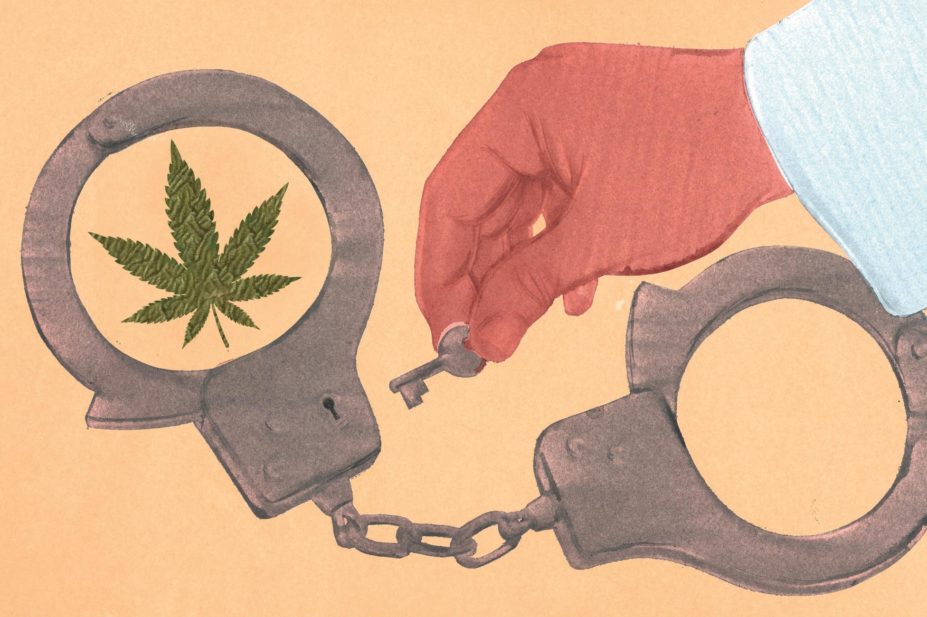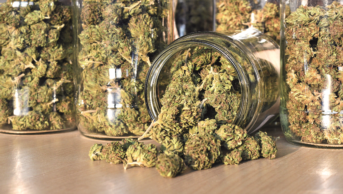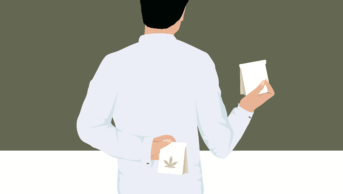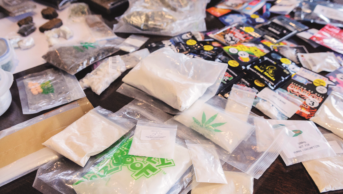
Alex Nabaum
The outlawing of the use of cannabis medicinally was done with political motives. There is no evidence to suggest that legalisation of cannabis for medicinal purposes would increase recreational use. It is time the UK government acts on evidence, allowing the use of medicinal cannabis and reducing barriers to its research.
Cannabis is one of the world’s oldest drugs, with evidence of its medicinal use in ancient Egypt, China and Siberia. As a tincture in alcohol, it was a medicine in the UK until 1971 and reputedly Queen Victoria was a regular user of it for period pains and post-partum discomfort. Her physician – Sir John Russell Reynolds – was a great proponent of the use of medical cannabis, writing a definitive account of its values in The Lancet in the 1890s[1]
. A century later, the 2000 House of Lords report on medical cannabis came to similar conclusions[2]
.
So why was cannabis removed from the pharmacopoeia in 1971? The answer is complicated: the proximate cause was an attempt by two London GPs who were campaigning for recreational cannabis to be made legal. They prescribed tincture of cannabis with instructions on how to apply it to tobacco so that it could be smoked. The GPs were struck off the medical register but, for purely political reasons, the Labour government at the time decided it could gain advantage by removing the drug from the pharmacopoeia. There was little outcry from the medical profession and so the ban was enacted and continues today.
The logic was unsound then and even more so today. In the 1970s, around half a million people in the UK had tried cannabis and, despite its illegal status, that number has risen to more than 10 million people today, and around half of young adults have tried cannabis. In 2000, the House of Lords recommended that cannabis be made legal for medicinal use. The government said it was sympathetic to this suggestion but soon turned against it to gain political advantage. Since then, successive governments have actively penalised both recreational and medicinal users of cannabis.
The arguments for this draconian approach are the potential risks of psychosis and the risk of more road traffic accidents, neither of which are well founded[3]
and have in fact been shown to be specious in countries with more lenient cannabis laws, such as The Netherlands.
Users of medicinal cannabis have been similarly targeted, with regular “dawn-raids” of officers breaking down front doors to catch wheelchair-bound patients suffering from multiple sclerosis (MS) and other chronic diseases with small amounts of cannabis for personal treatment. These people are inevitably prosecuted and then convicted.
There is no medical defence for the possession of cannabis, unlike many other drugs. The centuries-old common law Defence of Necessity was revoked, but for cannabis only, by the Law Lords in 2005[4]
. You can still claim that your possession of psilocybin, a naturally occurring psychedelic compound, is necessary for the treatment of your obsessive compulsive disorder but no beneficial effects of cannabis can be claimed to avoid conviction (although they may be used to help mitigate sentencing). Moreover, the police often compound matters by charging the partner (e.g. family, friends, spouses) with supply, which, for a class B drug, can lead to up to 14 years in prison, plus the seizure of all assets under the Proceeds of Crime Act.
Despite the risk of prosecution, it is estimated that more than 30,000 people use cannabis medicinally in the UK each day. Many more would undoubtedly do so if not for concerns about breaking the law. Recently, Norman Baker, the Minister of State for Crime Prevention, has called for the law to be changed to allow medicinal use[5]
.
Under the Misuse of Drugs Act 1971, cannabis is a Schedule 1 Class B drug. Schedule 1 drugs are deemed – by whom it is not clear but the Home Secretary has the final say – as those having no medicinal value. Holding or dispensing cannabis requires a Schedule 1 license that costs about £5,000 in real and opportunity costs (e.g. disclosure and barring service checks, lockable refrigerator, etc) and takes a year or so to obtain. Only four hospital pharmacies in the UK currently have such a licence so clinical cannabis research is almost non-existent. Amazingly, placebo cannabis (i.e. a cultivar that has almost no d9-tetrahydrocannabinol [d9THC], the psychoactive compound that gets people “high”) is also a Schedule 1 drug, which adds further regulatory complexity to its purchase and use for clinical research.
Medicinal benefits
Cannabis plants make up to a hundred organic compounds that might have therapeutic potential. Many of these were discovered by UK scientists. However, the ultra stringent regulations that restrict cannabis use have blocked research in the UK, the only exception being Sativex, an alcoholic solution of plant cannabis that contains a balanced mixture of d9THC and cannabidiol.
The development of this product for pain and spasticity in MS and related disorders was challenging scientifically but also in how it could be fitted into the Misuse of Drugs Act 1971 without opening the gates to other forms of cannabis. Finally, in 2013, the Advisory Council on the Misuse of Drugs recommended a Schedule 4 classification for Sativex – although it remains a Class B drug – but refuse to say if other alcoholic extracts would be similarly scheduled[6]
.
Pharmaceutical aspects
Because of the complex mixture of compounds in the cannabis plant, the active ingredients of herbal cannabis are hard to define. D9THC is clearly one because we know that synthetic or extracted variants of this (e.g. nabilone and dronabinol [THC]) have long been established medicines for conditions such as chemotherapy-induced nausea and cachexia. These are Schedule 2 Class B drugs.
Herbal cannabis contains d9THC and cannabidiol in differing ratios, with “skunk”-like varieties having increased levels of d9THC at the expense of reduced cannabidiol concentrations. This leads to greater psychoactive “stoning” actions but may also produce more addiction and psychotic experiences. There is evidence from the work of researchers at University College London that cannabidiol protects against the worst psychoactive aspects of d9THC and may itself have anti-addictive and antipsychotic properties[7]
.
Cannabidiol is “non-scheduled” because it does not produce a “high”. But this logic does not apply to all cannabis products since cannabidivarin is Schedule 1 Class B controlled despite not leading to “highs”[8]
. This is particularly unfortunate because it limits research on this drug, which preclinical studies suggest may be a highly promising new approach to treating seizures.
In the United States, many states have enacted Charlotte’s Web law (named after Charlotte Figi, who had severe myoclonic epilepsy of infancy), which allows cannabis use for refractive forms of epilepsy after a dramatic response in a young girl whose seizure count went down from hundreds a week to just a handful after cannabis treatment.
The other massive growth area for cannabis treatment is in various cancers. Cannabis oil is now widely used as self-medication for people with cancers who are non-responsive to conventional therapy. There are controlled trials of cannabis oil for skin cancers despite these being hampered by regulations, but research into systemic use of cannabis oil for other cancers is non-existent (although a trial of Sativex in gliomas is ongoing in the UK). However, the internet contains many personal and compelling testimonies of miraculous recoveries from a range of cancers treated with cannabis oil so there is real justification for more research in this field.
Other countries
The situation is different in many other countries. The Netherlands has always allowed the use of medicinal cannabis alongside recreational use in “coffee shops”. Now, about half of the states in the United States and Uruguay, Czech Republic, and Portugal, among others, have followed suit, which means that patients can be prescribed cannabis for a range of disorders. This has proved particularly popular in the United States where one obvious and welcomed benefit has been a significant reduction in deaths from prescription opiates as people in need of pain control switch to cannabis[9]
.
Coming soon
The legalised use of medicinal cannabis could easily happen in the UK and I believe this is likely to happen after the next general election. Both the Liberal Democrats and the UK Independence Party have said they are in support of medicinal cannabis. All that is required is for the Home Secretary to move cannabis from Schedule 1 to Schedule 2 because, by definition, any substance under Schedule 1 has no medicinal purposes, whereas under Schedule 2 it does. This would then exempt all pharmacies and hospitals from a licence requirement. The challenge will be getting supplies.
UK production is limited to one company, GW Pharma, which makes Sativex. It is unlikely that it could supply the explosion of demand that such a change would bring. One solution would be to allow personal growing of a couple of plants per person on prescription. However, much more will be needed and importation from medicinal cannabis suppliers, such as those that exist in The Netherlands, will be required. There is an eight-week limit on import licences, making importation of medicinal cannabis problematic unless the limit is extended.
Time for a comeback
Cannabis has always been a medicine and its removal from the pharmacopoeia in 1971 was an act that served no one except the politicians of the day. It manifestly failed to reduce recreational cannabis use but has become a barrier to research on the therapeutic potential of the plant since then, to the detriment of many hundreds of thousands of potential patients. Given the widespread availability and use of cannabis today, there is no reason to suppose that making it legal as a medicine would have any impact on recreational use.
Legalising cannabis for medicinal use would not only give patients another treatment option, but would also provide the scientific community with an opportunity to investigate its full potential in the medical world. A number of countries have loosened its tight laws already, the UK should follow suit.
David Nutt is a psychiatrist and the Edmund J. Safra professor of neuropsychopharmacology in the division of brain science, Department of Medicine, Hammersmith Hospital, Imperial College London
References
[1] Reynolds JR. Therapeutic uses and toxic effects of Cannabis indica. The Lancet 22 March 1890; 637–683.
[2] House of Lords cannabis report 2000. Available at: http://www.parliament.the-stationery-office.co.uk/pa/ld199798/ldselect/ldsctech/151/15101.htm (accessed 17 November 2014).
[3] ACMD 3rd cannabis report 2008. Available at: https://www.gov.uk/government/publications/acmd-cannabis-classification-and-public-health-2008 (accessed 17 November 2014).
[4] Nutt DJ. Necessity or nastiness? The hidden law denying cannabis for medical use [blog]. Available at: http://profdavidnutt.wordpress.com/2010/12/13/necessity-or-nastiness-the-hidden-law-denying-cannabis-for-medicinal-use/ (accessed 17 November 2014).
[5] Watt N. Drugs minister calls for legalising cannabis for medicinal use. Available at: http://www.theguardian.com/society/2014/aug/13/cannabis-norman-baker-liberalised-drugs-laws-health (accessed 17 November 2014).
[6] Nutt DJ, King LA, Nichols DE. (2013a) Effects of Schedule I drug laws on neuroscience research and treatment innovation. Nat Rev Neurosci. 2014;14:577–85. doi: 10.1038/nrn3530. Epub 2013 Jun 12.
[7] Morgan CJA, Curran HV. Effects of cannabidiol on schizophrenia-like symptoms in cannabis users. British Journal of Psychiatry 2008;192:306–307.
[8] Nutt D.J, King LA, Nichols DE. New victims of current drug laws. 2013 Nat Rev Neurosci. doi:10.1038/nrn3530-c2.
[9] Kuehn B. Author Insights: Legalizing Medical Marijuana May Reduce Opioid Deaths. Available at: http://newsatjama.jama.com/2014/08/26/author-insights-legalizing-medical-marijuana-may-reduce-opioid-deaths/ (accessed 17 November 2014).


